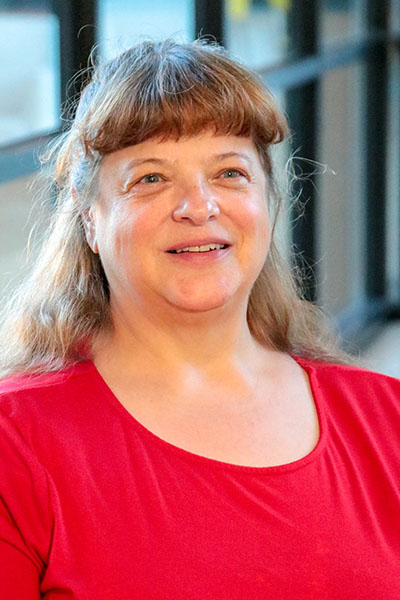Be That Person Who Makes A Difference

CPD coordinator of programs talks about microaggression
Before I tell you about an experience I had, let me tell you a little about myself. I am a middle-aged, paraplegic woman who uses a wheelchair. I have lived with my older sister, Suzann, for the past 30 years, and for 5 years before that, I lived on my own. I have worked at the CPD as a Staff Assistant and Coordinator for over 35 years. I drive a car, I go out and about in the community to movies, restaurants, etc., I even go st“rolling” around the USU campus in my manual wheelchair to try to get that ever-elusive 10,000+ steps a day to try and maintain good health. So, I am pretty much independent—physically as well as financially.
Not too long ago, Suzann and I went grocery shopping at a local supermarket. My sister goes to this supermarket daily to pick up groceries for her work so the staff there know her well and they greet her by name whenever she comes in. On this particular day, one of the greeters met us as we entered and gushingly exclaimed, “Oh, Suzann. It is so good of you to take your poor little crippled sister out shopping with you!”
I was stunned—actually, we were both stunned. In an instant, I felt like a helpless, useless individual who spent her life closeted in my home and dependent on my sister for my care. Suzann felt like she was being praised because she was showing charity towards someone less fortunate than her. I know this woman had no ill intent—it was a completely innocent and sincere compliment. But it hurt and it hurt deeply. Yes, I can laugh about it now, and I use the experience to illustrate microaggression.
The Merriam-Webster online dictionary defines microaggression as “a comment or action that subtly and often unconsciously or unintentionally expresses a prejudiced attitude toward a member of a marginalized group (such as a racial minority, individuals with a disability, those with an alternative lifestyle).” I will focus primarily on individuals with disabilities, as that is what I am personally most acquainted with and have the most experience with; however, it applies to all groups of marginalized individuals. In the example I gave above, this woman—either consciously or subconsciously—assumed that just because I was in a wheelchair, I was dependent upon others for any and all my needs.
We are all guilty of this. For instance, how many times when we encounter a person who is blind, do we automatically start speaking louder so they can hear us? We mean no disrespect, we just do not think first before we act…or we assume things that are not true.
The other day I was with a group of people and one of them asked, “So, do you work?” When I replied that I have worked at USU for the past 35 years, this same person asked, “In what department do you work?” When I told her the Center for Persons with Disabilities, she replied, “Of course, that makes sense.”
I do not work at the CPD BECAUSE I have a disability…I work there because I can help those in my community and across the country who have a disability. Someone else then asked, “How do you get to work…I mean, can you drive?” A couple innocent questions and an assumption that were equally offensive, albeit unintentionally—within a period of less than two minutes. The individuals involved probably didn’t even realize that those questions were demeaning to me.
How many of us have told the oh-so-funny blond joke or the ever-popular Pollock joke? We laugh and then share the joke with family, friends, and colleagues who may or may not be blond or Polish and then when they are offended, we say that it was just a joke or they were being too sensitive. Whether they were or not, the fact remains that it hurt or offended somebody and we were the one to blame.
If we find ourselves in the position where we hear someone saying something that could be offensive or hurtful, especially to someone whose self-esteem may already be low, we should do something about it. The continued use and frequency of these little pricks slowly start chipping away at our armor and they leave a mark—a mark that can have devastating effects on an individual.
There is enough pain and hurt in the world…we don’t need to add to it. As we become more conscious about what we say or do and educate others, we begin to make a difference…one person at a time. And one little thing can make a difference, which everyone knows if you’ve ever tried to sleep while a little mosquito buzzes around your head.
Be that person who makes a difference.

